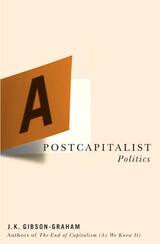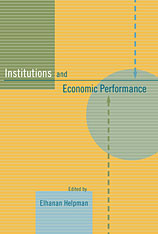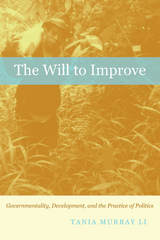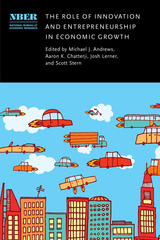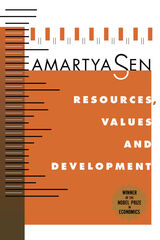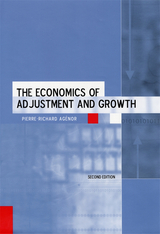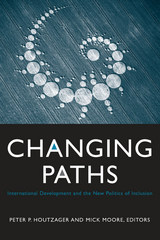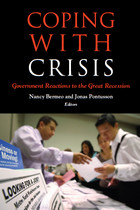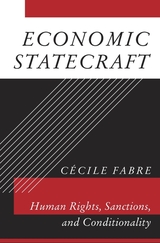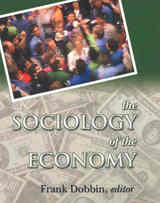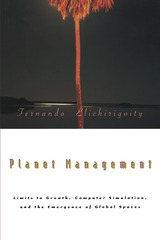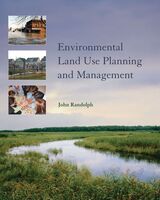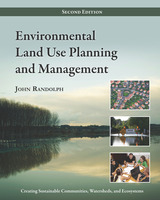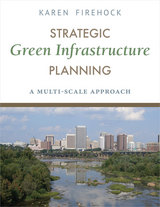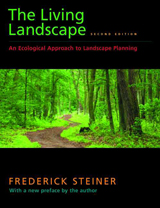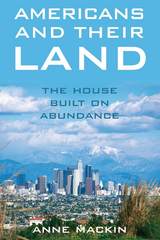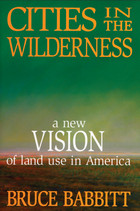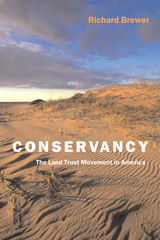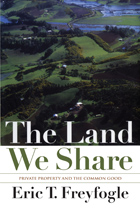A Postcapitalist Politics
by J.K. Gibson-Graham
University of Minnesota Press, 2006
Cloth: 978-0-8166-4803-0 | Paper: 978-0-8166-4804-7
Library of Congress Classification HD87.G52 2006
Dewey Decimal Classification 338.9
Cloth: 978-0-8166-4803-0 | Paper: 978-0-8166-4804-7
Library of Congress Classification HD87.G52 2006
Dewey Decimal Classification 338.9
ABOUT THIS BOOK | TOC
ABOUT THIS BOOK
Is there life after capitalism? In this creatively argued follow-up to their book The End of Capitalism (As We Knew It), J. K. Gibson-Graham offer already existing alternatives to a global capitalist order and outline strategies for building alternative economies.
A Postcapitalist Politics reveals a prolific landscape of economic diversity—one that is not exclusively or predominantly capitalist—and examines the challenges and successes of alternative economic interventions. Gibson-Graham bring together political economy, feminist poststructuralism, and economic activism to foreground the ethical decisions, as opposed to structural imperatives, that construct economic “development” pathways. Marshalling empirical evidence from local economic projects and action research in the United States, Australia, and Asia, they produce a distinctive political imaginary with three intersecting moments: a politics of language, of the subject, and of collective action. In the face of an almost universal sense of surrender to capitalist globalization, this book demonstrates that postcapitalist subjects, economies, and communities can be fostered. The authors describe a politics of possibility that can build different economies in place and over space. They urge us to confront the forces that stand in the way of economic experimentation and to explore different ways of moving from theory to action.
J. K. Gibson-Graham is the pen name of Katherine Gibson and Julie Graham, feminist economic geographers who work, respectively, at the Australian National University in Canberra and the University of Massachusetts Amherst.
A Postcapitalist Politics reveals a prolific landscape of economic diversity—one that is not exclusively or predominantly capitalist—and examines the challenges and successes of alternative economic interventions. Gibson-Graham bring together political economy, feminist poststructuralism, and economic activism to foreground the ethical decisions, as opposed to structural imperatives, that construct economic “development” pathways. Marshalling empirical evidence from local economic projects and action research in the United States, Australia, and Asia, they produce a distinctive political imaginary with three intersecting moments: a politics of language, of the subject, and of collective action. In the face of an almost universal sense of surrender to capitalist globalization, this book demonstrates that postcapitalist subjects, economies, and communities can be fostered. The authors describe a politics of possibility that can build different economies in place and over space. They urge us to confront the forces that stand in the way of economic experimentation and to explore different ways of moving from theory to action.
J. K. Gibson-Graham is the pen name of Katherine Gibson and Julie Graham, feminist economic geographers who work, respectively, at the Australian National University in Canberra and the University of Massachusetts Amherst.
TABLE OF CONTENTS
Contents Preface and Acknowledgments Introduction: A Politics of Economic Possibility 1. Affects and Emotions for a Postcapitalist Politics 2. Reluctant Subjects: Subjection and Becoming 3. Constructing a Language of Economic Diversity 4. The Community Economy 5. Surplus Possibilities: The Intentional Economy of Mondragón 6. Cultivating Subjects for a Community Economy 7. Building Community Economies Notes Bibliography Previous Publications Index Preface and Acknowledgments Hope is the difference between probability and possibility. -Isabelle Stengers This is a hopeful book written at a time when hope is finally getting a hearing but also a battering. Between the completion of the manuscript and the writing of this preface the seemingly intractable nature of the world's problems has impressed itself on us quite powerfully. A recently aired BBC documentary on "global dimming" showed how airborne industrial pollutants are blocking sunlight from reaching the earth, with the effect of lowering temperatures; as particulate matter in the air decreases in response to policy, however slowly and reluctantly enacted, global warming will proceed at a much faster rate than is currently projected. According to the documentary, the Ethiopian famine that killed ten million people in the early 1980s was due to the failure over more than a decade of the yearly monsoon, as the water-laden tropical air mass was prevented from moving northward by the northern hemisphere's pollution haze-a shocking wake-up call about global responsibility. On top of all the environmental news one of us has just discovered that she is not exempt from what feels like a breast cancer epidemic in women of the "developed" world. From the global scale to the place closest in we have been presented with the enormity of "what pushes back at us" (to use the words of our inspirational activist friend Ethan Miller) when we attempt to imagine and inhabit a world of economic possibility. Both of these "events" highlight in different ways the ethical imperatives and challenges of the interdependence that this book attempts to bring into focus. All too clearly we are being presented with the unintended effects of "development." All too starkly we can see that increased consumption with its promise of heightened well-being is bought at the expense of destruction of the global atmospheric commons we have taken for granted over the past two centuries. It is not only African families who have born the brunt of "our" development, but perhaps also women in wealthy countries and cancer sufferers in general whose bodies are registering something counterintuitive-the downside of a "good life." We can only feel awed by and grateful for the committed and competent complexes of surgeons, oncologists, radiographers, and their instruments and institutions that interact with a state and privately supported knowledge commons to address breast cancer (something the feminist movement has made a priority). We can only feel ashamed that our respective nations (Australia and the United States) are the two industrialized countries that have refused to sign the Kyoto Agreement to limit greenhouse gas emissions and begin to arrest global warming. How is it that the wealth of nations readily flows into tackling one piece of this interdependent picture and is vigilantly restricted from addressing the other? In our bitter moments we are tempted to relate this asymmetry to the perceived workings of the economic growth machine in which low-cost coal and oil burning are seen to be central and women's post-child-bearing bodies are basically irrelevant. Our respective governments are prepared to direct resources into breast cancer research and treatment, and will even foot the bill for much of the scientific research that has identified the interactions of global dimming and global warming, but agreeing to put in place the already existing technology and regulations that could halt destruction of our environmental commons is at present beyond them. For us this is a matter for urgent discussion and a case where rethinking what constitutes an "economy"-if we are willing to countenance the continued existence of such a domain-may actually be crucial. In this book we broach global and local interdependence around economic issues of necessity, surplus, consumption, and commons. We bring these issues out of the realm of abstract theorizing and into everyday practices of living together and building alternative futures. Our own interdependence as the collective author J. K. Gibson-Graham gives us the fortitude (foolhardiness?) to address such monumental issues and the embodied insights into processes of self-cultivation that might equip us to become ethical subjects of a postcapitalist order. Emerging from the mutuality of our relationship and especially our interdependence with others, the book is the neatly bound tip of a ramshackle iceberg. We recognize that publishing and affixing our name to this volume consigns its contributing factors to subaqueous obscurity. "Authored, authorized, and authoritative," as Sadie Plant cautions, "a piece of writing is its own mainstream" (1997, 9). What is wondrous to contemplate is its emergence at the confluence of events, people, relationships, and things, and to watch it flow toward the pooling oceans of anonymity, to be dispersed and taken up once again in the hydrological cycle of de- and re-textualization, and eventually transmuted into other streams and icebergs. In less watery but no less embracing terms we might simply acknowledge our understanding that "all and everything is naturally related and interconnected" (Plant 1997, 11; quoting Ada Lovelace) and leave it at that. But we will not get away so easily. Gratitude is not entailed in a moment of metatheoretical recognition: it is an orientation toward the world, indistinguishable from its embodiment in everyday practices. Here we wish to indulge in a practical exercise of gratitude by tracing a few of the interdependencies that made this book. We'll start with the interdependence between A Postcapitalist Politics and its predecessor, The End of Capitalism (As We Knew It): A Feminist Critique of Political Economy, published in 1996. We are immensely appreciative of the offer of the University of Minnesota Press to reprint that book along with A Postcapitalist Politics, and we especially value Carrie Mullen's bracing enthusiasm for both projects. Separated by a decade of thinking, researching and living, these two volumes are intricately interconnected and yet very different. In The End of Capitalism, J. K. Gibson-Graham was the quintessential "theory slut," happily and carelessly thinking around, playing with "serious" and consequential subjects like political economy, loving the theory she was with, offering ebullient arguments and heady claims about representations of capitalism and their politically constraining performativity. We spoke to our readers as somewhat wayward feminists who seemed to relish their positioning as mildly outrageous, quirkily funny, and ambiguously gendered. It might come as a shock, then, that A Postcapitalist Politics has a completely different feel; it reads like a wholesome, even earnest, treatise on how to do economy differently. The authorial stance is open, exposed, even vulnerable, entirely different from the shimmering armor of the earlier book (and much less fun, we fear). In writing that book we felt a perhaps unwarranted confidence, conferred by our lengthy training in political economy, that no one could say things about capitalism that we hadn't heard before and didn't have a response to. This book offers us no such safe havens. What, apart from menopause and inevitable aging, has contributed to this shift in stance and affect? Perhaps it has been our awakening to the different kinds of politics that are possible, along with an enhanced ability to hear as well as speak. In our own relationship (which has spanned almost three decades), the Pacific Ocean, time differences of fourteen to sixteen hours (depending on daylight savings) and countless other spatiotemporal dis- and con-junctures, and an opening up to listening to each other have had transformative micropolitical effects. As with the projects we review in this book we have been confronted by the challenges of collaboration-the comforts and discomforts of collectivism, the bounds and liberties of (joint-) identity, the struggle to make collaboration work not just for itself but for its participants. Our relationship has become a space for the exploration of techniques of self-cultivation that help us to observe ourselves more closely, listen to each other more openly, and constitute ourselves more proactively. From the theory sluts of 1996 to the self-help junkies of 2006, we have navigated a personal path that ever enriches as new challenges of relating and thinking/writing together arise. This never-ending process of becoming has developed and extended our understanding of politics. It has affirmed the importance of the politics of the personal and the spaces closest in-the self-narratives that can plague and restrict or release and enable our experiments, the material and psychic interdependencies that we can celebrate and amplify or exploit and deplete. Both of us have been blessed with the gift of domestic communities that sustain and contribute to our collaboration. In the United States, the twelve or so members of the Cooleyville community have shared weekly Monday night dinners and interpersonal support with us for three decades, constituting a home and non-kin-based family that is a community economy. In Australia the small clan of David, Daniel, and Lillian Tait has provided a loving practice space for the best and worst performances of self and ethical decision-making by the mother of us, and a welcoming site for the enactment of our unusual (at least to suburban Canberra) collaboration. Space and place have been crucial ingredients in our collaboration. In a relationship that spans the globe, neither can ever be taken for granted. Indeed the materiality of distance has been an ever-present factor, and this is perhaps why we feel the need to acknowledge the places where we have met to work, for each has contributed its special quality to our thinking and feeling in this book: the large welcoming house on Town Farm Road in Shutesbury, Massachusetts; the end of the road caravan at Merry Beach, New South Wales; Ann's Stepping Stones B&B in New Hampshire, with its astonishing two acres of flowers and shrubs; the family-sized swap house on College Hill in Eugene, Oregon; the little house graciously added on to 307 Antill Street in Watson, Australian Capital Territory; tiny Tiri Crest on Waiheke Island and the comfortable big house in Moeraki, two New Zealand places with inspiring ocean views; the lovely garden cottage on Phillip Island, Victoria; the elegant sufficiency of the Maranese in Bellagio, Italy; and the Plymouth Harbor retirement community with its water birds and poetry readings in Sarasota, Florida. In the attempt to enact a postcapitalist politics the environment of academia has been a powerful and permissive factor in creating the world of possibility that enables "other worlds" to actually arise. Despite the encroaching commercialization, casualization, and rationalization of our institutions, academia in general and geography in particular have offered us a nurturing communal backwater in which to float our half-baked ideas and hair-brained projects. In our own and other departments and disciplines, we and our colleagues are free to attend each other's talks, offer and receive comments on each other's papers, teach and learn from each other's students, visit and speak in each other's lecture series, and draw on an intellectual commons that benefits from what Harvie calls "convivial competition" (2004, 4). None of these activities is free of dysfunction and some may be prone to it, but they nevertheless constitute a platform for "commons-based peer production"-again, Harvie (2004, 4), quoting Yochai Benkler, who writes primarily about open source or free software-that values collaborative engagement, and respects and requires the sharing/gifting of output. That the academic commons is hard won and not to be taken for granted is brought home to us daily by the evidence of what currently threatens it. Today, for example, we discovered that a colleague in political science has patented his solution to a game theory problem. The gift economy of academia (Harvie 2004) is neither a pleasant nor a productive place to be without an open affective disposition and a desire to relate to, rather than dismiss or colonize, the work and specializations of others. As an environment for creativity the commons does not maintain itself but requires a continual investment of effort and particular technologies to shape and replenish it. In the innovative philosophical workshops at Isabelle Stengers's institution, for example, the convenors promote a practice of slowing down, to allow for "people not just to express what they were thinking anyway but to feel their thought becoming part of the collective adventure" (2003, 252). By creating rules to preclude people "knowing what they think" the stewards of this environment allow for events in thought and feeling to emerge out of a "kind of collective stammering" (252). Both at home and away we have been privileged to be in many such environments. One current instance is the seminar "The Rule of Markets" at New York University, chaired by Timothy Mitchell. Tim shares with us an interest in denaturalizing the "economy," pushes us to acknowledge the recent materialization of such an entity via the operation of a complex set of technologies and practices, and encourages us (as does Michel Callon, another participant) to pursue and develop our economic experiments. Another is the ongoing multi-year graduate seminar at the Univerity of Massachusetts, including Ken Byrne, Kenan Ercel, Stephen Healy, Yahya Madra, Ceren ¿szel¿uk, Joe Rebello, Maliha Safri, Chizu Sato, and Peter Tamas, in which the collective stammering occurs mainly at the intersection of psychoanalysis, poststructuralist Marxism, and the theory and practice of community economies. The Department of Human Geography in the Research School of Pacific and Asian Studies at the Australian National University provides yet another such environment in which ongoing field and dissertation research and seminars produce events in thought that nourish, jolt, and transform the projects we are engaged in. From friends and colleagues we have received what is necessary to our survival: new and old ideas, reactions, suggestions, criticisms, references, inclusion in other projects, intellectual support of all kinds, and the warmth and generosity of appreciation. So lavish have Jack Amariglio and George DeMartino been with their appreciation that our joint sense of possibility will never be the same. A central ingredient of our economic theorizing is the Marxian theory of class developed by our friends, colleagues, and coeditors Steve Resnick and Rick Wolff. Their antiessentialist class language allowed us in The End of Capitalism to denaturalize capitalist dominance, opening the way to queering economic space and producing a language of economic diversity. In this book we foreground the class language more prominently in an alternative (counterhegemonic) discourse of economic difference and activate its core concern for an economics of surplus as a focus for the ethical dynamics of a community economy. An economics of surplus is one of the major theoretical contributions of members of the Association for Economic and Social Analysis (AESA), an organization of economists and others that produces the journal Rethinking Marxism and has provided us with great store of friendship and fun not usually associated with the dismal science. We would be unable to think and write as we do were it not for the insights of Jack Amariglio on (economic) subjectivity, among many other topics; Steve Cullenberg on diverse economies and class processes; George DeMartino and David Ruccio on imperialism, globalization, ethics, and politics; Kevin St. Martin on class and community; Yahya Madra on rethinking communism; Ceren (zsel(uk on mourning and class politics; and many other AESA members whose work has added to and enriched the ideas presented in this book. Arturo Escobar's ability to know what we are arguing before we do has had countless benefits for our work, for which we are truly grateful. One of the many catalysts for this book was the invitation to participate in the project Women and the Politics of Place (WPP), led by Arturo and Wendy Harcourt (editor of the journal Development) and involving more than twenty feminist activists and academics around the world. In the face of our reluctance to become involved in yet another project, Arturo twisted our arms ever so compassionately, bringing us into a conversation that eventually helped us to crystallize the feminine political imaginary we articulate in A Postcapitalist Politics. In our perennial search for more freeing and complex understandings of affect, we revisited a familiar location, the writings of Eve Kosofsky Sedgwick, ever our muse. Her thoughts on queer theory guided us in The End of Capitalism, and her wonderful exploration of reparative and paranoid thinking in the book Touching Feeling enabled us to process the reception of our work in positive ways. That book draws to some extent on her earlier coauthored work on Silvan Tomkins, a psychologist who productively fails to distinguish the theory-affect interactions generated by individuals processing their own experience from the interplay of intellect and emotions in what usually passes for "theory." William Connolly and Jane Bennett have been inadvertent collaborators with us in writing A Postcapitalist Politics, their work having provided both philosophical and practical encouragement to take heed of micropolitical shifts in affect and to chart a politics of possibility in the face of incredulity and sometimes disdain. Our longstanding project of rethinking economy has gained force, clarity, and insight from the work of many others who are similarly engaged. Economic anthropologist Stephen Gudeman's important book The Anthropology of Economy and his earlier writings with Alberto Rivera have influenced our thinking in profound ways, encouraging us to conceptualize a community in terms of its commons and stimulating us to pursue action research as a conversation both with the voices in the air and those on the ground. Steve Gudeman, Tim Mitchell, and J. K. Gibson-Graham have been drawn into a loose affiliation of academics and activists interested in challenging and rethinking "economic representations" instigated and shepherded over the past few years by David Ruccio and later Steve Cullenberg. We have gained insights and inspiration from the work of fellow scholars and friends Lau Kin Chi, Ruben George Oliven, Evan Watkins, Dwight Billings, Judith Mehta, David Ellerman, and Will Milberg, among others. One of our greatest debts of gratitude is to the readers who spent valuable time and energy processing the unwieldy first draft of this manuscript and whose comments were extraordinarily helpful when we came to revise and clarify the argument of the book. Larry Grossberg offered enthusiasm and challenging judgments in just the right mix; Eric Sheppard likewise provoked and affirmed in equal measure; John Pickles and his graduate reading group at the University of North Carolina gave us targeted reactions and imaginative responses far beyond our expectations of a manuscript review. Ethan Miller's review became our oracle as we embarked on the rewriting process; he enabled us to recognize that the book had a structure and a tripartite political vision incorporating a language politics, a politics of the subject, and a politics of collective action. All readers were able to grasp what we were struggling to express, and their assistance in helping us bring what we wanted to say to the fore was a gift of collegiality in the best possible sense. To experience it as a gift nevertheless required a conscious exercise in gratitude on our parts and a daily undertaking to treat the sometimes painfully honest reviews as a positive resource and input to our work. That this practice had only beneficial results probably does not need saying; that it produced a new relation to ourselves, our reviewers, our work, and the review process in general probably does. It was a first shared instance of taking to heart the Buddhist injunction to practice gratitude for adversity, difficulty, and opposition (in this case criticism) as part of a path toward a more open and joyful way of being in the world. During the past decade we have engaged in a number of action research projects with large research teams made up of colleagues, students, community members, nongovernmental organizations, and local government authorities. Each project has produced its own research community with a knowledge commons that we draw on in many of the chapters of this book. On the U.S. side, action research for "Rethinking Economy: Envisioning Alternative Regional Futures" in the Pioneer Valley of Massachusetts was supported by a grant from the National Science Foundation (Grant No. BCS-9819138) and conducted by members of the Community Economies Collective (co-researchers Brian Bannon, Carole Biewener, Jeff Boulet, Ken Byrne, Gabriela Delgadillo, Rebecca Forest, Stephen Healy, Greg Horvath, Beth Rennekamp, AnnaMarie Russo, Sarah Stookey, and Anasuya Weil). Seventeen community researchers were employed part-time by the project, and they and their interviewees are identified pseudonymously in the text. All of the team but especially Becky, Ken, and Stephen devoted themselves to the project with the unstinting energy that is known as "life blood," creating an extraordinary team process and product. The insights and analyses of the research team are inextricable from our own, and their presence is palpable in all we have written. A number of social researchers have helped us to understand and practice action research as a collaborative endeavor. We learned from Steve Gudeman to experience social research as a form of conversation; from Ceren ¿szel¿uk to steer a path between pressing one's own agenda and refusing out of fear or guilt to intervene in a community; from Michel Callon to think about practicing research alongside rather than on a group or organization, collaborating with what he calls "theorists in the wild," not by becoming an activist but by maintaining the specificity of one's activities as a social scientist and making connections with other knowledge producers. In all of our action research projects we encountered the wonderful generosity and interest of local residents who participated in the processes we initiated. For this input we are immensely grateful. Our experience of research as a series of orchestrated conversations in localities/sectors confirms our intuition that the power dynamics often represented as contaminating the academic/nonacademic relation are neither as simple to understand nor as difficult to negotiate ethically as some might think. In Australia, action research in the Latrobe Valley was supported by grants from the Australian Housing and Urban Research Institute and the Australian Research Council (grant numbers A79703183 and C79927030), with further financial and in-kind support provided by the Latrobe City Council. The research was conducted with colleagues Jenny Cameron and Arthur Veno and employed community researchers Yvonne Joyce, Stephen Lister, Leanne Vella, Nicki Welsh, and Alan Riley. The names of the community members who formed enterprise groups and participated in the project and whose voices are heard in the text have been changed. Institutional support for this project was skillfully offered by Julie Hocking and David Powell of the Latrobe City Council. Research in the Latrobe Valley would not have been possible without the incredible commitment, skill, and insight of Jenny Cameron, our colleague, dear friend, comrade, and Community Economies Collective member. Jenny "ran" the project day to day and night by night for its duration. She was the constant academic face of the project in the community, and we would like to acknowledge her huge contribution to what it achieved. Her reflections on the process of subject-becoming that the project initiated have provided inspiration for much of the analysis included here, and her own writings and our coauthored outputs about the project must be seen as companion pieces to Chapter 7. Our work with the Asian Migrant Centre in Hong Kong was initiated in collaboration with Lisa Law, who must be sincerely thanked for bringing J. K.Gibson-Graham's writings to the notice of this organization and especially to Rex Varona and Bien Molina. We have benefited enormously from Lisa's sensitive volunteer work with the AMC, which provided a secure and trusting base upon which our own research collaboration has been built. May-an Villalba, Nimfa Lloren, and Rosario Cañete of Unlad Kabayan Migrant Services Incorporated have been enthusiastic supporters of our work and co-researchers and facilitators of the Philippines action research project that we report on here. Action research in the Philippines has been funded by the Australian Research Council (Grant No. LP0347118) in partnership with Australian Agency for International Development as part of the project "Negotiating Alternative Economic Strategies for Regional Development in Indonesia and the Philippines." We gratefully acknowledge the contribution of colleague Deirdre McKay specifically to the conceptualization and conduct of the Philippines aspect of the project located in Jagna, Bohol, and Linamon, Mindanao. In chapter 8 we draw on invaluable field research done by Joy Apag, Maureen Balaba, Amanda Cahill, Nimfa Lloren, and Deirdre McKay as part of the Jagna research team, and Kathylen Cocomas and Noel Salonga on the Linamon research team. All members of the wider research group, including Amanda Cahill, Deirdre McKay, Kathryn Robinson, Andrew McWilliam, Jayne Curnow, Ann Hill, and Catharina Williams, have provided scholarly input into the clarification and application of ideas around the community economy. Our work on diverse economies has been extended and developed by participants in the "diverse economies conversation" within English-speaking geography, a loose association formed after a series of sessions organized with Andrew Leyshon at the annual meetings of the Association of American Geographers in 2003. This growing network of more than twenty-five geographers includes old and new colleagues who are excited by the prospect of researching and performing diverse political and economic geographies. Over the period of gestation of this book we have been generously supported by many institutions and their support staff. Most consistently our homes in the Department of Human Geography in the Research School of Pacific and Asian Studies at the Australian National University and the Department of Geosciences at the University of Massachusetts Amherst have hosted our writing retreats, supported our research leaves and field work visits, and offered congenial environments for our joint work. Michael Williams, head of Geosciences at UMass, has unfailingly supported every untimely request and departure from normal procedure occasioned by our research and writing practice. Sandra Davenport from the Australian National University has contributed her excellent copyediting, bibliographic, and indexing skills to our book and for this, as well as her ever cheerful and encouraging aura, we are deeply thankful. With little more than strong European chocolate as an incentive, Peter Tamas of UMass spent hours clipping and tailoring the film stills for chapter 2 to our demanding specifications. Cartographer Kay Dancey from the Australian National University contributed her design expertise with enthusiasm and grace to the figures and maps that illustrate the book. A collaborative writing residency at the Rockefeller Foundation's Bellagio Study and Conference Centre in 2005 provided a once-in-a-lifetime experience of validation and luxurious support that contributed in major part to the completion of this manuscript. A fellowship at the International Center for Advanced Study at New York University in 2004-2005 supported Julie during most of the period of the writing of the book. A visiting fellowship and sabbatical fellowship at the Humanities Research Centre at the Australian National University afforded another wonderful institutional context for our joint writing process in 2003. Extended visits to The Johns Hopkins University at the invitation of Jonathan Goldberg and Michael Moon and to the University of North Carolina at the invitation of Arturo Escobar, Larry Grossberg, and John Pickles affirmed and cemented collaborative friendships across decades and disciplines. Each chapter of A Postcapitalist Politics has its hidden collaborators, some of whom we have space to mention. Steve Cullenberg and the other organizers of Marxism 2000 at UMass Amherst and Phil O'Neill, Bob Fagan, and Pauline McGuirk, organizers of a session at the meeting of the Institute of Australian Geographers in Perth in 1998, got us working on the Full Monty paper that ended up in chapter 2. Kay Anderson, Nicholas Brown, Jane Jacobs, and Tim Rowse drew our attention to key source materials, and Graeme Byrne offered reflections on growing up in Yallourn, all of which made their way into chapter 3. Michelle Billings transcribed sections of the focus group discussions reported in that chapter. David Ruccio and the above-mentioned members of the graduate seminar at UMass offered formative comments on chapters 4 and 5. Race Mathews and Fred Freundlich helped Katherine Gibson organize a visit to Mondragon in 1997, and the Australian Research Council provided financial assistance for this trip, contributing directly to early versions of chapter 6. Friends not previously mentioned whose work and support have inspired and nourished us include Kathy Addelson, Marta Calas, Dipesh Chakrabarty, Ruth Fincher, Nancy Folbre, Michael Garjian, Gay Hawkins, Richie Howitt, Lesley Instone, Sharon Livesey, Linda Malam, Katharine McKinnon, Mary Louise Pratt, Debbie Rose, Linda Smircich, and Sophie Watson. Friends whom we cannot imagine life without (not all of these are living) can never be fully acknowledged for their contributions to our sustenance, but we offer our infinite gratitude to Affrica, Alfie and Megan, David and Lisa, Georgia and Greg, Helen, Helene, Jack and Christina, Jenny and Ramonda, Judy and Jack, Julie, Laurie, Michael and Jonathan, Peter and Lillian, Sharon and Neil, Sophie and Jeri, Susan and Stephen. Finally, we would like to acknowledge the members of the editorial and production staff at the University of Minnesota Press for their attentiveness, good humor, professionalism, imagination, and unfailing helpfulness. Many thanks to Carrie Mullen, Jason Weidemann, and others at Minnesota for a wonderful experience. Introduction A Politics of Economic Possibility Origins and Overtakings It seems that the making of a new political imaginary is underway, or at the very least a remapping of the terrain of politics. Coming into being over the past few decades and into visibility and self-awareness through the Internet, independent media and most recently the World Social Forums, this emergent imaginary confounds the time-worn oppositions between global and local, revolution and reform, opposition and experiment, institutional and individual transformation.1 It is not that these paired evaluative terms are no longer useful but that they now refer to processes that inevitably overlap and intertwine. This conceptual interpenetration is radically altering the established spatio-temporal frame of progressive politics, reconfiguring the position and role of the subject, as well as shifting the grounds for assessing the efficacy of political movements and initiatives. We glimpse the broad outlines of a new political imaginary in the performative self-designations of the "movement of movements"-We Are Everywhere, Other Economies are Possible, One No, Many Yeses, Life After Capitalism2-and in the statements of movement activists like John Jordon: Our movements are trying to create a politics that challenges all the certainties of traditional leftist politics, not by replacing them with new ones, but by dissolving any notion that we have answers, plans or strategies that are watertight or universal...We are trying to build a politics...that acts in the moment, not to create something in the future but to build in the present, it's the politics of the here and now. When we are asked how we are going to build a new world, our answer is, "We don't know, but let's build it together.".... 3 Perhaps the most frequently acknowledged well-spring of this new imaginary is the Zapatista uprising in Mexico. Rejecting the old revolutionary ordering of means and ends and the "two-step strategy" of seizing state power as a prelude to social transformation (Wallerstein 2002), the Zapatistas have moved directly to institute what has been seen as a "post-capitalist" indigenous communalism (Neill 1997). Like the other movements for whom they have become both ally and avatar of possibility, their goal is not to wrest control but to create autonomous zones of counter-power (Klein 2002, 220):4 By asserting and creating multiple other ways of being in the world, these movements rob capital [or the state] of its monopoly and singular definitions of time, space and value, thereby destroying its hegemony, while at the same time furnishing new tools to address the complex set of problematic power relations it confronts us with from particular and embedded locations. (Osterweil 2004, 8, insert added) The Zapatistas' symbolically loaded performances of "local" action have been instantly communicated via the Internet, and in countless other parallel movements the ebullience and "event" of anarchic situationism has been given new life. Some of these movements are short-lived, their antics embodying the political value of interruption (as distinct from endurance), producing an affective shock wave that reverberates through the brittle architecture of established forms. Describing the Reclaim the Streets (RTS) movement, for example, Rebecca Solnit observes that ...humor, creativity, outrageousness, and exuberance were among the group's hallmarks. That RTS didn't outlive its moment was also a kind of victory, a recognition that time had moved on and the focus was elsewhere. Instead, RTS's incendiary carnival spirit, global Internet communications, and tactics of temporary victory became part of the vocabulary of what came next, the global justice movement. RTS decomposed itself into the soil from which new flowers sprang. (2004, 89) Like the Zapatistas, these groups use playfulness and humor to toss us onto the terrain of the possible (Bennett 2001b).5 Poetry and political action are united in conscious attempts to disrupt and initiate.6 In the words of Subcomandante Marcos, Zapatismo is "an intuition" and a dream, and the Zapatistas are "the voice that arms itself to be heard. The face that hides itself to be seen." Their "true secret weapon" is language (Klein 2002, 212, 222-23). And also, perhaps, what their language has enabled-a re-visioning of power and a re-theorizing of revolution, from strategy and tactics to affect and energetics. The Zapatistas, the World Social Forum, and movements like Reclaim the Streets are charting a globally emergent form of localized politics. This "place-based globalism" (Osterweil 2004) has a distinctive feel that Solnit lucidly captures: The embrace of local power doesn't have to mean parochialism, withdrawal, or intolerance, only a coherent foundation from which to navigate the larger world. From the wild coalitions of the global justice movement to the cowboys and environmentalists sitting down together there is an ease with difference that doesn't need to be eliminated, a sense that...you can have an identity embedded in local circumstances and a role in the global dialogue. And that this dialogue exists in service of the local. (2004, 113) Place-based globalism constitutes a proliferative and expansive spatial imaginary for a politics that offers a compressed temporality-traversing the distance from "nowhere" to "now here."7 From our locations in academia at two ends of the world we have a sense that events have overtaken us. Ten years ago, when we were writing The End of Capitalism (As We Knew It): A Feminist Critique of Political Economy (TEoC), we imagined it as an invitation and perhaps a prelude to a new economic politics. Such a politics, we hoped, would venture along the obscure byways of noncapitalist construction, encouraging projects of economic experimentation, adding to the repertoire of what was considered legitimate political action. Feeling suffocated and disempowered by prevailing conceptions of what was possible, and when and how it was to be achievable, we located our dissatisfaction within the dead-end time-space of capitalism as it was usually theorized. Today we see ourselves as part of a movement that is actively re-theorizing capitalism and reclaiming the economy here and now in myriad projects of alternative economic activism. Our project has been gathered up in the whirlwind of inventions and interventions, resonating with some, amplifying or amplified by others, above all sharing sentiments and stances with respect to the tasks of transformation. The distinctive contribution we hope to make to this wider project stems from our starting point, as elaborated in TEoC.8 Wanting an economic politics that allowed us to think creatively and to start now and here to make new economies, we focused our attentions in TEoC on ways of thinking that distanced the economy from politics. These included the tendency to represent economy as a space of invariant logics and automatic unfolding that offered no field for intervention; the tendency to theorize economy as a stable and self-reproducing structure impervious to the proliferative and desultory wanderings of everyday politics; the tendency to constitute "the" economy as a singular capitalist system or space rather than a zone of cohabitation and contestation among multiple economic forms; and the tendency to lodge faith in accurate representation that guaranteed and stabilized the prevailing substantive framings.9 We noted that these tendencies contributed to the prevalence of an affect and attitude of entrenched opposition (on the left, at least), a habit of thinking and feeling that left little emotional space for alternatives, and that instead focused the political imagination-somewhat blankly-on a millennial future revolution. If the "revolution" was to occur in a time-world discontinuous with this one, it was not possible to talk about steps and strategies for getting there. In the years since the appearance of TEoC we have been gratified and encouraged by a profusion of alternative economic research that has challenged these representations, some of it inspired by our own deconstruction and queering of Capitalism, much of it welling up from the same productive dissatisfactions we had experienced with essentialist and abstracted thinking about economy. Here we acknowledge the proliferation of work in our "own field" of economic geography, and in cultural and political geography, as well as in the fields of economic sociology and anthropology, cultural studies, politics, feminism, Marxian political economy and science studies.10 If capitalism is still a dominant signifier in social analysis, it is, for many of us, less taken for granted in its character and configurations than ever before.11 The heady and hopeful message of TEoC was that our economy is what we (discursively and practically) make it.12 The salutary and grounded message of A Post-capitalist Politics is that we must be ready with strategies for confronting what forcefully pushes back against the discursive imaginings and practical enactments we associate with building a different economy. What we feel is needed, and what we present here, is our own, admittedly idiosyncratic, practical guide to the politics of "taking back the economy." Having completed our 1996 book with a desire for a new kind of economic politics, the question became how to proceed. Situated as we are in academia, tied to teaching timetables and the administrative demands of our institutions, we devised action research projects that could be locally pursued. The need for proximity to our field sites meant that their siting was relatively arbitrary. They include the resource region of the Latrobe Valley in Victoria, Australia, the mixed agricultural-industrial-higher education-ex-hippy economy of the Connecticut Valley in Massachusetts, USA and most recently the agricultural community of Jagna Municipality, in the southern Philippines island province of Bohol.13 All these places have experienced economic dislocation wrought by processes including privatization, deindustrialization, sectoral restructuring, rapid growth, and stagnation. With the vision of a diverse economy in mind we have spent much of the last decade participating in community level conversations about the heterogeneous (capitalist and noncapitalist) economies of these places and engaging with people in a process of creating both the subjects and enterprises of "intentional community economies." Enlivened and supported by the emerging political imaginary we have outlined above, we have focused our energies on what we take to be the specific deficits and challenges (and thus pressing requirements) of economic politics: the need for a new language of economy to widen the field of economic possibility, the self-cultivation of subjects (including ourselves) who can desire and enact other economies, and the enrolling collaborative pursuit of projects of economic invention and construction. The Makings of an Imaginary From the earliest days of this political exploration, we recognized the special challenges of economic politics-the obduracy of the economic object as it had been discursively framed and practically constructed; the poverty of economic subjectivity, with its few identity positions and contracting (if also intensifying) desires; and the persistent conviction that large-scale, coordinated action was required for the task of economic transformation. In the search for successful political projects and practices to encourage and inspire us, we have turned primarily to second-wave feminism.14 We never fail to be amazed at how the feminist movement has transformed and continues to transform households, lives, and livelihoods around the world to different degrees and in different ways, rendering the life experiences of many women literally unrecognizable in the terms of a generation ago.15 Here we are thinking of everything from the increased participation of women in public life, to the social recognition of and responsibility for domestic violence, to the proliferation of options of gendered embodiment. This is not to deny that these achievements are partial and embattled, but rather to affirm that they are recognizable and widespread.16 The crucial role of alternative discourses of "woman" and gender in this process of transformation cannot be overestimated. But second wave feminism also offered new practices of the self and of intersubjective relation that enabled these new discourses to be inhabited in everyday life. The decentralized, uncoordinated and place-based consciousness-raising groups that became the movement's signature intervention (at least in the English-speaking world) acted as the foundational site for a "politics of becoming" (Connolly 1999, 57), unleashing myriad practices and performances of "woman." The slogan "the personal is political" authorized women to speak of their concerns in legitimate tones, enabling them to connect the private and public, the domestic and national, shattering forever the rigid boundaries of established political discourse. The practice of feminism as "organizational horizontalism" fostered alternative ways of being (powerful) including "direct and equitable participation, non-monopoly of the spoken word or of information, the rotation of occasional tasks and responsibilities, the non-specialization of functions, the non-delegation of power" (Alvarez et al. 1998, 297). Feminism linked feminists emotionally and semiotically rather than primarily through organizational ties. Without rejecting the familiar politics of organizing and networking within groups and across space, individual women and collectivities pursued local paths and strategies that were based on avowedly feminist visions and values but were not otherwise connected. The "upscaling" or globalization of a feminist politics did not involve formal organization at the global scale to challenge global structures of patriarchal power.17 It did not rely on (though did not eschew) coordinated actions and alliances. The movement achieved global coverage without having to create global institutions, though some of these did indeed come into being. Ubiquity rather than unity was the ground of its globalization. We are intrigued at the way the loosely interrelated struggles and happenings of the feminist movement were capable of mobilizing social transformation at such an unprecedented scale, without resort to a vanguard party or any of the other "necessities" we have come to associate with political organization. The complex intermixing of alternative discourses, shared language, embodied practices, self-cultivation, emplaced actions and global transformation associated with second-wave feminism has nourished our thinking about a politics of economic possibility-impressing us with the strikingly simple ontological contours of a feminist imaginary: if women are everywhere, a woman is always somewhere, and those places of women are transformed as women transform themselves. This vision of feminist politics as grounded in persons yet (therefore) potentially ubiquitous has been extended in our thinking to include another ontological substrate: a vast set of disarticulated "places"-households, communities, ecosystems, workplaces, civic organizations, bodies, public arenas, urban spaces, diasporas, regions, government agencies, occupations-related analogically rather than organizationally and connected through webs of signification. A feminist spatiality embraces not only a politics of ubiquity (its global manifestation) but a politics of place (its localization in places created, strengthened, defended, augmented, transformed by women.) In this admittedly stylized rendering feminism is not about the category, woman, or identity per se, but about subjects and places. It is a politics of becoming in place.18 The achievements of second wave feminism provide, for us, the impetus for theorizing a new global form of economic politics. Its re-mapping of political space and possibility suggests the ever-present opportunity for local transformation that does not require (though it does not preclude and indeed promotes) transformation at larger scales. Its focus on the subject prompts us to think about ways of cultivating economic subjects with different desires and capacities and greater openness to change and uncertainty. Its practice of seeing and speaking differently encourages us to make visible the hidden and alternative economic activities that everywhere abound, and to connect them through a language of economic difference. If we can begin to see noncapitalist activities as prevalent and viable, we may be encouraged here and now to actively build upon them to transform our local economies. Enactments and Emergences If the successes of second wave feminism give us confidence that indeed "another world is possible" and offer the global outlines of a practical politics, specific projects of economic transformation suggest guidelines as to how to proceed in a more everyday sense. Locally based social movement interventions all over the world are already embodying many of the features of the political imaginary we have been tracing, building new economic futures within a clearly enunciated commitment to a politics of possibility. One such project is a slum dwellers' initiative, the Alliance, in Mumbai, India, where half of the 12 million citizens are slum and pavement dwellers; another is an overseas migrant worker initiative, the Migrant Savings for Alternative Investment (MSAI) program, that targets vulnerable Asian workers, especially those from the Philippines where 7.5 million people (10 percent of the population) support their families by migrating overseas for employment.19 Against the "tyranny of the emergency"-the poverty and privation that find people living on the street or working for years with no political rights in a foreign country-these initiatives practice a "politics of patience" and "utility" (Appadurai 2002, 30). What distinguishes the two initiatives is the constructive content of their actions. The Alliance enrolls slum dwellers in saving for and constructing housing and in producing knowledge of their situation through self-surveying and enumeration. This contributes to a politics of visibility and self-affirmation as well as giving them control of a large part of the housing policy process in Mumbai.20 The MSAI program enrolls contract migrant domestic servants and seafarers in the practice of investing in community-based enterprises in their home countries. Migrant indentured laborers are trained in social entrepreneurship and in conducting alternative business feasibility studies, and helped to negotiate with officials from their home provinces to obtain business advice and assistance. Savings groups are the consciousness raising groups of the Alliance and the MSAI program. It is in these small groups that individuals embark on a project of ethical self-transformation in Foucault's (1997) terms or a micro-politics of (re)subjectivation in Connolly's (1995, 1999). To join such a group is to engage in new practices of the self-setting aside savings from what is already too little to live on in the case of the women slum dwellers, or in the case of the migrant workers, denying themselves or their families some portion of the enhanced consumption usually associated with migration.21 In the process new senses of self are instituted-through self-development as citizens, house-designers, investors or entrepreneurs, through self-recognition of their survival capacities as poor women and migrants, through daily re-commitment to the cultivation of solidarity. The savings groups focused on individual self-transformation are the foundation upon which alternative economic interventions are built. In both instances the transformation of the conditions of poverty is spearheaded by the poor themselves. Poverty and seeming powerlessness become the base from which daily action is sustained, rather than a grounds for its postponement. Possibilities for influencing change are identified in the face of a realistic understanding of the extent and limits of the forces that constrain them. Particulars of authority, domination, and coercion that might neutralize or negate their interventions are examined and ways to exercise power are found.22 In an environment where domestic workers are legally denied freedom of movement or association for six days out of seven, domestic servants involved in the MSAI program meet in public spaces on their one day off to discuss investment and enterprise development plans. In a city where public demonstrations are viewed (and often suppressed) as an incitement to riot, the slum dwellers hold toilet festivals to inaugurate functioning public toilets with invitations offered to state officials, World Bank representatives and the middle classes. Through this action a daily public act of humiliation and major cause of disease is transformed into a scene of "technical innovation, collective celebration, and carnivalesque play" (Appadurai 2002, 39) as well as a site for policy promotion. From the work of the Alliance and MSAI there is a lesson to be learned about the potentially global reach of locally focused activities and organizations. The Alliance participates with similar federations in fourteen countries on four continents in the Shack/Slum Dwellers International (SDI). The federations make site visits to each other to learn from each other and hasten the pace of innovation. Migrant savers and investors from all over the world who participate in the MSAI program also meet annually to share experiences and gain the knowledge and inspiration to further replicate the savings-investment-enterprise model.23 The site visits and annual meetings facilitate supportive feedback and debate-questions and criticisms raised by a distant partner are often more fruitful than those of local allies, which may produce or exacerbate wounds and divisions. In general, international visits and gatherings are used to strengthen the organizations in place; the global scale of activities exists to facilitate success at the local level-rather than being a goal in itself, of becoming global to confront global organizations and structures of domination. These interventions/organizations teach us about the freedom to act that is at the core of a politics of possibility. Each of them works with and accepts funding from governments, international agencies, foundations or collaborating partners that may not share their values and goals. While recognizing the risk of cooptation that such relationships pose, they refuse to see cooptation as a necessary condition of consorting with power. Instead it is an ever-present danger that calls forth vigilant exercises of self-scrutiny and self-cultivation-ethical practices, one might say, of "not being coopted." More generally, each group's understanding of power enlarges the field of their own effectivity. There is little if any representation of a global scale apparatus of power that must be addressed and transformed before their activities can succeed or be extended. Indeed they could be seen as refusing to root their poverty and problems in any ultimate origin (such as capitalism) that might displace their antagonism from those problems themselves. As such theirs is a political and ethical practice of theory, and an everyday practice of freedom. In the theoretical practices and practical commitments of the Alliance and the MSAI we can discern the lineaments of the emerging political imaginary that we have identified with a politics of possibility in the here and now: * the centrality of subjects and of ethical practices of self-cultivation; * the role of place as a site of becoming, and as the ground of a global politics of local transformations; 24 * the uneven spatiality and negotiability of power, which is always available to be skirted, marshalled or redirected25 through ethical practices of freedom (while at the same time making them necessary); * the everyday temporality of change and the vision of transformation as a continual struggle to change subjects and places and conditions of life under inherited circumstances of difficulty and uncertainty. All these things are part of the ontology of a politics of possibility, and the theoretical commitment to such an ontology is an ethical act of enabling such a politics. The (feminist) imaginary of possibility that underpins and motivates our politics did not arrive fully formed in our imaginations, but has been distilled from our various experiences over the past decade and more. It has been crystallized in thought through our activities in the field, and through interactions with ideas, projects, NGOs and many people. In our various attempts to enact a noncapitalist economic politics we have experienced the pushing back of dominant discourses and our own fears and feelings (see Chapter 2 for an exploration of these). It is clear to us that a politics of possibility (and the theoretical choices that constitute it) cannot simply be put "out there" in the world with the hope that it will flourish. It needs to be sustained by the continual work of making and remaking a space for it to exist in the face of what threatens to undermine and destroy it. This work has involved addressing the materiality of other ways of thinking-other ontologies, competing political imaginaries, and sedimented affective and intellectual stances that claim superior status as approaches to theory. Just as members of the Alliance and participants in MSAI have to work daily on cultivating themselves as subjects able to enact new futures-as thinkers of possibility, as strategic activists who confront all kinds of specific forms of domination, authority, manipulation, coercion and seduction and who nevertheless continue to mobilize their local capacities for change-we must similarly cultivate ourselves as activists and subjects of noncapitalist economies. The self-education and formation of ourselves as thinkers of theorized possibility is crucial to this practice. An Ethics of Thinking "Think the same, remain the same." (Octaviana Medrano, Mexican electrnics worker quoted in Pena (1997, 177) If you want to change yourself, change your environment. If you want to change the world, change yourself. (Varela 1992)26 Many years ago a favorite teacher said to one of us: "Your mind is a judging rather than a tasting mind." We took the comment as a reminder that the mind has the capacity for either or both. What was understood (though perhaps not intended) was that the capability of "tasting" was present in an undeveloped form and needed only to be cultivated, despite the categorical finality with which its absence was announced. Just as the Buddhist tradition understands the innate goodness of humanity as the capacity to be good under certain conditions of cultivation (Varela 1992), so we can recognize our "innate" capacity to linger with the object and process of thought in a ruminative space of not knowing. Extending this recognition, we might see that we possess the capability (and ever-present option) of opening to what is novel rather than familiar in situations, of cultivating the ability to produce more novelty, of providing an incubating environment for half-baked ideas, while at the same time working against impulses to squelch and limit. Acknowledging this option is the beginning of cultivating ourselves as theorists of possibility. We were originally trained to see and represent a social object (the capitalist economy) structured by concentrations of power, and qualified by deficiencies of morality and desirability. This vision gave way some time ago to a recognition of ourselves as theorizing, authorizing subjects of economy. Where once we believed that the economy was depoliticized largely through its representations, we have more recently come to understand that its repoliticization requires cultivating ourselves as subjects who can imagine and enact a new economic politics. Bolstered by the upwelling of various movements across the world we see the need not only for a differently theorized economy but for new ethical practices of thinking economy and becoming different kinds of economic being. The co-implicated processes of changing the self/thinking/world is what we identify as an ethical practice. If politics is a process of transformation instituted by taking decisions in an undecideable terrain, ethics is the continual exercising, in the face of the need to decide, of a kind of choice to be/act/think a certain way. Ethics involves the embodied practices that bring principles into action. Through self-awareness and transforming practices of the self that gradually become modes of subjectivation, the ethical subject is brought into being (Foucault 1985, 28).27 Writing, for Foucault, is an ethical practice, a way that the self relates to itself. It is an intellectual discipline that allows us to consider "the possibility of no longer being, doing or thinking what we are, do, or think... seeking to give new impetus, as far and as wide as possible, to the undefined work of freedom" (1997, xxxv). We would like to extend Foucault's vision of writing to the practice of thinking, recognizing as "technologies of the self" the cultivation of certain kinds and capacities of thought. 28 The recognition that affect is crucial to ethical practice and interlayered with thought offers a clue as to how one might cultivate oneself differently: An ethical sensibility...is composed through the cultural layering of affect into the materiality of thought....To work on an established sensibility by tactical means, then, is to nudge the composition of some layers in relation to others. (Connolly 2002, 107) It is difficult to imagine how to engage in such nudging, in part because it is difficult to apprehend what we are actually doing when we are thinking/writing. We are generally not conscious of our pervasive styles, that is, "how we deal with our selves and things in our everyday coping" (Spinosa et al. 1997, 17) and certainly not of most of our ways of bringing feeling and thinking together to produce more thinking and feeling. Coming from a tradition in which the best thinking is held to be dispassionate, we recognize as a minority position the claim that all thinking is conditioned by feeling.29 Yet it is possible that the most crucial aspect of our thinking is the emotional orientation we bring to it. To make things even more difficult, our seldom-inspected common sense posits a separation-or even opposition-between thought, understood as cerebral reflection, and action, understood as embodied engagement with the world. This makes it hard to see thinking itself as a kind of action-that we are doing thinking, in other words, touching the world and being touched by it and in the process things (and we) are changing. The ethical self-cultivation we undertake to produce ourselves as beings who can act spontaneously in desired ways is therefore unlikely to be addressed to our thinking. In our functioning as casual or professional economic thinkers, for example, we do not often engage in reflective assessment-one of the tools of ethical self-cultivation-of the effects of our thinking practices upon ourselves and the world. We are more likely to see ourselves engaging in a universally available, emotionally neutral process of enlarging understanding, than as situated in a specific setting with particular social goals and affective entailments, localized products and standards of success, and urgent requirements of self-attention. Yet the kinds of choices we continually make about what to do and how to act in particular situations are also required of us as thinkers. These include the stances we adopt, the affective dispositions that color our thinking and impinge on consciousness as feeling-practical curiosity and openness to possibility, for example, or moral certainty and the acceptance of constraint. They also include the techniques we employ to actualize those stances in particular thought undertakings. To cultivate new attitudes and practices of thinking is to cultivate a new relation to the world and its always hidden possibilities: "Thinking participates in that uncertain process by which new possibilities are ushered into being" (Connolly 2002, 1). The spirit of our thinking is a matter for ethical decision, as is the choice of techniques and practices of thinking.30 In this book we engage in three specific thinking techniques that both draw upon and prompt the affective orientations of openness/freedom, interest/curiosity and joy/excitement. 31 Over the past decade we have been living, experiencing, provoking and promoting these techniques and the emotional stances that enable and accompany them. But it is only now in the writing of this book that our ways of doing thinking, as our core ethical practice, are starting to become clear. Cultivating ourselves as thinking
See other books on: Capitalism | Economic Policy | Feminism & Feminist Theory | Gibson-Graham, J.K. | Political science
See other titles from University of Minnesota Press
Nearby on shelf for Industries. Land use. Labor / Economic growth, development, planning:
9780674715585
9781610911696
